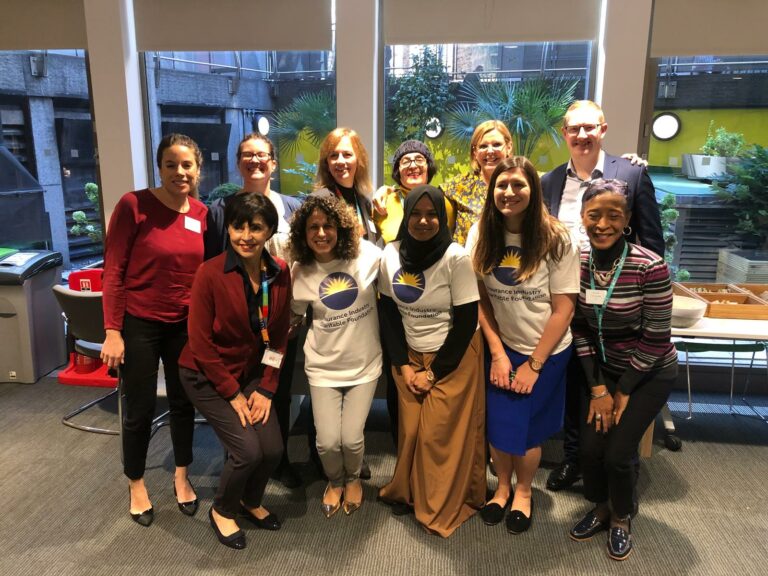
Vera Skulteti – Head of Sales Operations
Q: Could you start with your past experiences that have shaped your career today?
Well to start, I did my bachelor’s degree in economics, finance and accounting back home, in Hungary.
My first real job was as a member of the bidding committee for the Euro 2012 bid. As you can imagine, it was really really intense because we wanted it to come to us and given we were doing a joint bid with Croatia, we knew it was going to come to an end but we thought we had a chance of winning. I learned so much, not just within my role but I had always had a really strong work ethic and this role solidified that. We were working 16 hour days and sometimes they called me in the middle of the night because I was the only one who could speak a decent level of English; so I would be translating interviews in the office at 3am to produce the transcript that had to go on the news in the morning, and then be back into the office for the usual start only a few hours later.
As you can imagine it was crazy intense but it was so exciting – we got to meet lots of famous people – and that was also a learning curve; when you’re young you have a perception about people more senior to you and celebrities, thinking they were always right but meeting them made me realise they were no different from me and that bubble burst a little.
That was a very busy 12 months and because of that, I paused my studies for about 6 months as it wasn’t feasible to work 16 hour days on top of studying and exams. As part of my university course, there’s a lot of language studies (French and English) and then you have to do advanced level exams to get your degree.
After university, my first job was in a marketing company. I took a finance role obviously because of my degree so I started to work there as a Finance Assistant. Work became slightly monotone there as it was a small agency so I moved onto my next role as a Finance Manager and quickly got promoted through the business, becoming a Director at the age of 26.
At this point, I felt like I had reached a bit of a ceiling regarding my job and was missing a challenge / didn’t want to become comfortable; I had always thought about living in a different country so made the decision to move to the UK.
So, I moved here and worked in Starbucks because I couldn’t find a job in my own profession. I was working for Starbucks for about 10 months and it was probably the most challenging time of my life. I was on my own and after rent, barely had enough money to pay bills and eat, even after working double shifts. What was funny though was that I was working in a Starbucks in Camden and somehow I lived half an hour from there… I don’t know how that happened given there’s a Starbucks on every corner!
Back in Hungary, we didn’t really have coffee shops like we did in the UK then so I wasn’t prepared for the madness of everybody flooding in for coffee from the tube; we were one of the busiest Starbucks in North London so we were busy all day long so as you can imagine, I was having to buy new shoes all the time as I didn’t stop running! It was a huge education with regard to customer service and dealing with difficult people. I also thought I was just going to be making coffee but actually it was all about cleaning all day – my hands were super dry, my feet ached all day, I was hungry as I didn’t have any money to buy food to eat – it was quite challenging. The worst part was that I didn’t have any time to apply for any jobs so I left Starbucks with the focus to find a role. I submitted hundreds of applications but no one came back to me. It was hard but I decided I couldn’t continue to live like this so I moved back to Hungary.
Managing a long distance relationship with my partner in the UK was of course difficult but we made a lot of time to visit each other and that strengthened our relationship so much that I then decided to move back to the UK after 6 months with the plan to move in with them and really focus on finding a job. Once back in the UK I almost immediately got a chance for an interview and a job off on the back of it. It was a finance manager role with a strong starting salary and my life back in the UK flourished.
My role as Finance Manager was a great first role to get back into and I quickly was promoted to head up the whole team. This was the first time I started to work with sales closely since we didn’t have a sales operations person and I just organically picked up a lot of the responsibilities.
I was really interested in Salesforce (bearing in mind this was the classic version of Salesforce) and started using my finance knowledge and intrigue in Salesforce to get into structuring contracts and pricing. This came purely from a personal interest but then I thought something wasn’t right as through this, I noticed we weren’t making enough money. Again I leveraged my financial background to re-evaluate how we did business, wrote business and executed contracts. I introduced a pricing structure and calculator which they still used 8 years on, long after I’d left the organisation.
My CEO there was honestly one of the best mentors I’ve had. We started as an email marketing automation company but we expanded so quickly into loads of different marketing activities. We were headquartered in Austria but that quickly expanded across Europe and the Middle East which was such an exciting period although it meant standardization was key to success and scale for the business as there were so many different sales teams and processes. I often had to travel to Turkey and Austria to introduce new processes, explain strategies and do the training for the team.
My CEO then moved to Dubai after a few years and whilst invited to join him and the team there, my focus was within the UK and growing my career there. Having a mentor like him was really career changing and I am so happy to have been there but also saw that as an opportunity to move on in my journey.
I went back into a finance role, starting in middle management but was quickly recognised by my CEO and promoted to Head of Finance. This was incredibly exciting as I evolved this role to cover business improvement which gave me the ability to lean process and aid financial savings for the business. These changes didn’t go unnoticed and very soon Finance, Legal and Compliance, HR, Sales Ops, IT and Operations were brought together so I became Director of Finance and Operations.
Whilst this was an amazing role it was also incredibly hard as I had such a wide remit. We did a great job at bringing the company and the functions to an amazing level where we became profitable and then things started to tick along nicely. So after about 4 years I decided that it was time to move on.
I started to freelance to get back into what I enjoyed doing; help focus on process improvements to make sure the business is running at an optimal level with the help of different software, like Salesforce and systems implementation for a variety of companies although if I’m honest, that can sometimes be a difficult task as people aren’t often positively receptive to system changes and innovations.
My role is to question and scrutinise because if that wasn’t done, you can put all the money into processes and software but you won’t have the cash flows needed to pay the bills, so it was a lonely place at times. It made me realise I didn’t want to carry on with this route throughout my whole career. So I put out feelers with a few companies but was approached by Vitesse to interview whilst I was in the interview process for another organisation.
There was little difference to the roles themselves but what made my decision was the people. My experience is that people make not just a company, but your happiness, drive and ability to flourish in a business and that’s what I got from the team at Vitesse.
Q: What is your role at Vitesse? What would a typical day look like?
When I used to work in finance, every part of the month you had your different tasks to complete. At the beginning and end of the month is like payroll, where you have to submit the accounts, midmonth net cash flows, budget, all this stuff.
But with sales ops, there’s no typical day and that’s really good and what I like the most about this job. One day I can be working in Salesforce and building out new features and functionality, researching add-ons or having a look at new tech stacks. Another day I can be working with Sales looking at deals and the pipeline or onboarding new staff and delivering training.
There’s a massive variety and that’s what I really enjoy. Being part of a start up with a focus on scaling is that when a new challenge is encountered or a new process request is made, it’s an opportunity to think about how to solve this, connecting the dots, and collaborating with teams across the business to deliver change.
Q: What do you enjoy most about your role?
I really enjoy working with people and collaborating to make a difference. At Vitesse, we have so many bright colleagues, they are amazing to work with and I learn so much from them. Being able to dive in and discuss the everyday is so important, not just to pick things up from them but as a way to identify not just new opportunities but ways in which we can make a process better.
Being in a business where you can share suggestions and solutions in a safe space, met with positivity is refreshing and one of the reasons I love working here.
Q: Any tips for getting into the industry / your role?
I’m almost completely self-taught, as far as tech goes and something I have noticed is that there’s no real training for getting into this role so taking initiative is key when it comes to not only opening doors, but in seeing success. You have to get the basics right. It’s very much based on interest and whilst there’s a lot of resources you can tap in to, you have to go find them. Of course, you can start with CRM systems as a good basis to improve your understanding.
I’ve seen an evolution across my time in this role with how access to learning can be achieved; we’ve moved on from reading books in libraries when I was doing my degree, however I still read a lot of books. Books not just about sales but about processes. Podcasts, internet blogs and articles can be a huge inspiration (there’s a sales ops podcast, used to be called Sales Ops Demystified, now RevOps Demystified – check out the interview with me on Spotify if interested – where they interview a lot of people about their career path and successes) and these give practical advice, in near real-time. I have gained knowledge from these on numerous occasions about how new systems have been implemented, what’s been successful and also what hasn’t worked; learning from mistakes is also very important.
This role is based heavily on logic so my finance degree gave me a very good basis to build upon as these subjects are driven by logic; especially with Salesforce as they pride themselves in not giving you a lot of coding to do and supplying the tools needed to resolve issues without the need to understand that level of technology. That being said, they offer lessons on coding so you can develop your skill set and their Trailhead learning suite is perfect to upskill not just you, but your sales team too so that you all utilise the systems in place to deliver the best returns.
Some key tips when it comes to the role is that firstly you need to have a strong relationship with your sales team; join calls, be part of sales meetings, understand your sales process and how it works, as opposed to just being told. Having a seat at the table when it comes to joining sales meetings is invaluable. And never underestimate the value of asking questions and asking sales directors to teach you or explain things to you; a basic interest and openness in wanting to learn.
Also, be mindful that things change really quickly in the technology arena and you always have to be up to date with advances in the market, so research is key as there is so much new stuff coming out all the time and it’s hard to make sense of it all and cut through the noise. Whilst I have spent a long time getting to know the basics it’s important to say that this is hugely fundamental for a variety of reasons; not just so that I can add the biggest value, build the best systems, tech stacks and strategies for the company I’m in, but because it’s the basis to sifting through new proposed features and functionalities of tech and ensuring delivery of the best ROI.
Q: What is the best piece of advice you have received?
The best piece of advice, I think, is also the most infuriating piece of advice – perhaps that’s why it was so good; it is to not take things personally. I received that advice when I was very young, about 18.
When you hear something like that, it’s hard because everything is personal – I’m a person, you’re a person – so how can you not take something personally?
Being 20 years older now, I’ve figured out that it’s not about taking something personally, it’s taking stuff that applies to you and leaving the rest that doesn’t apply to you.
I think this piece of advice more generally needs to be reworded. Advice is good to know and good to hear but it’s important to take it as it is and then work on it. When somebody says something to you that is not true to you, or is not worth considering, then you don’t have to take everything another person says as it could just be their reflection and something being projected onto you, not your personality.
Q: What would you say is your biggest achievement?
Well, one of them is running a half marathon. That was a huge achievement. It’s a lot of training – a half marathon may not sound that impressive, but it’s already 21k. So that’s running a really long time! I did it in 2 hours and 10 minutes, which is a pretty good time, but completed it in Wimbledon….possibly the hardest one to run in London. Also, I set my alarm incorrectly the night before for the morning, which made it considerably harder. You train and plan and prep for months and months to the event; nutrition is everything. So I planned my morning for my porridge etc, but overslept. That extra hour in bed was a killer as despite hoping to have the time to get something to eat when I got there before the race started, when I arrived there wasn’t the time so I ran the half marathon on an empty stomach, with no gels – it’s safe to say the banana and orange I received at the end of the race were more than welcome!
Other than that, I’m really proud that I created a new life and a new career in a completely different country on my own. I had no family or friends in the UK and now when I look at my life, I know that’s a big achievement.
Q: What do you like doing in your spare time?
I really love reading. I love spending time with my friends; going for walks and eating out with them. I travel a lot and meet new people and engross myself in all the different cultures.
I am hugely in to my sports and recently have really got back into my running. I used to play basketball professionally and found horse riding really fun although I’ve yet to find places to kick start these back up.
Taking a break and fresh air is hugely important to me as I’m often ploughing through a lot of data and reports in my role but thankfully my two sausage dogs – Peanut and Jerry – help give me a welcome break when taking them for walks around our local parks!









